重庆大学研究生公共英语作文What is a sound mind
- 格式:docx
- 大小:13.65 KB
- 文档页数:1
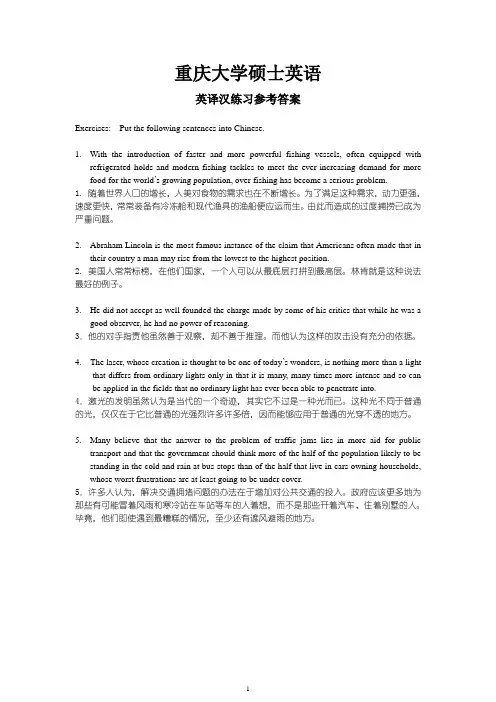
重庆大学硕士英语英译汉练习参考答案Exercises: Put the following sentences into Chinese.1.With the introduction of faster and more powerful fishing vessels, often equipped withrefrigerated holds and modern fishing tackles to meet the ever-increasing demand for more food for the world’s growing population, over-fishing has become a serious problem.1. 随着世界人口的增长,人美对食物的需求也在不断增长。
为了满足这种需求,动力更强,速度更快,常常装备有冷冻舱和现代渔具的渔船便应运而生。
由此而造成的过度捕捞已成为严重问题。
2.Abraham Lincoln is the most famous instance of the claim that Americans often made that intheir country a man may rise from the lowest to the highest position.2. 美国人常常标榜,在他们国家,一个人可以从最底层打拼到最高层。
林肯就是这种说法最好的例子。
3.He did not accept as well founded the charge made by some of his critics that while he was agood observer, he had no power of reasoning.3.他的对手指责他虽然善于观察,却不善于推理。
而他认为这样的攻击没有充分的依据。
4. The laser, whose creation is thought to be one of today’s wonders, is nothing more than a lightthat differs from ordinary lights only in that it is many, many times more intense and so can be applied in the fields that no ordinary light has ever been able to penetrate into.4.激光的发明虽然认为是当代的一个奇迹,其实它不过是一种光而已。

重庆大学硕士研究生《英语 》课程试卷(B 类)2013~2014 学年 第 一 学期(秋)开课学院: 课程编号: 考试日期: 2014.1.9考试方式:考试时间: 120 分钟题 一硕士生B 类答题纸 英语班次:_______________ Answer SheetPart I. Reading Comprehension ( 40 points, 1-10 20points; 11-20 20points)1. ( )2. ( )3. ( )4. ( )5. ( )6. ( )7. ( )8. ( )9. ( ) 10. ( )11. ( ) 12. ( ) 13. ( ) 14. ( ) 15. ( )16.( ) 17.( ) 18.( )19..( ) 20.( )Part II. Translation from English to Chinese ( 20 points)Part III. Translation from Chinese to English ( 20 points )Part IV . Writing ( 20 points)(请写在背面,Please write your composition on the reverse side.)命题(组题)人: 李雁审题人: 黄萍 命题时间:2013.12研究生院制学院 专业(领域) 类别 ( 学术 、专业 ) 学号 姓名封线密重庆大学硕士研究生《英语》课程试卷2013~2014 学年第一学期硕士生B类Part I: Reading Comprehension 40%Directions: Read the following passages carefully and then select the best answer from the four choices given to answer the questions or to complete the statements that follow each passage. Write your answer on your Answer Sheet.Passage OneWe might marvel at the progress made in every field of study, but the methods of testing a person‟s knowledge and ability remain as primitive as ever they were. It really is extraordinary that after all these years, educationists have still failed to device anything more efficient and reliable than examinations. For all the pious claim that examinations test what you know, it is common knowledge that they more often do the exact opposite. They may be a good means of testing memory, or the knack of working rapidly under extreme pressure, but they can tell you nothing about a person‟s true ability and aptitude.As anxiety-makers, examinations are second to none. That is because so much depends on them. They are the mark of success of failure in our society. Your whole future may be decided in one fateful day. It doesn‟t matter that you weren‟t feeling very well, or that your mother died. Little things like that don‟t count: the exam goes on. No one can give of his best when he is in mortal terror, or after a sleepless night, yet this is precisely what the examination system expects him to do. The moment a child begins school, he enters a world of vicious competition where success and failure are clearly defined and measured. Can we wonder at the increasing number of …drop-outs‟:young people who are written off as utter failures before they have even embarked on a career? Can we be surprised at the suicide rate among students?A good education should, among other things, train you to think for yourself. The examination system does anything but that. What has to be learnt is rigidly laid down by a syllabus, so the student is encouraged to memorize. Examinations do not motivate a student to read widely, but to restrict his reading; they do not enable him to seek more and more knowledge, but induce cramming. They lower the standards of teaching, for they deprive the teacher of all freedoms. Teachers themselves are often judged by examination results and instead of teaching their subjects, they are reduced to training their students in exam techniques which they despise. The most successful candidates are not always the best educated; they are the best trained in the technique of working under duress.The results on which so much depends are often nothing more than a subjective assessment by some anonymous examiner. Examiners are only human. They get tired and hungry; they make mistakes. Yet they have to mark stacks of hastily scrawled scripts in a limited amount of time. They work under the same sort of pressure as the candidates. And their word carries weight. After a judge‟s decision you have the right of appeal, but not after an examiner‟s. There must sure ly be many simpler and more effective ways of assessing a person‟s true abilities. Is it cynical to suggest that examinations are merely a profitable business for the institutions that run them? This is what it boils down to in the last analysis. The best comment on the system is this illiterate message recently scrawled on a wall: …I were a teenage drop-out and now I are a teenage millionaire.‟1. The main idea of this passage isA. examinations exert a pernicious influence on education.B. examinations are ineffective.C. examinations are profitable for institutions.D. examinations are a burden on students.2. The author‟s attitude toward examinations isA. detestable.B. approval.C. critical.D. indifferent.3. The fate of students is decided byA. education.B. institutions.C. examinations.D. students themselves.4. According to the author, the most important of a good education isA. to encourage students to read widely.B. to train students to think on their own.C. to teach students how to tackle exams.D. to master his fate.5. Why does the author mention court?A. Give an example.B. For comparison.C. It shows the result of court is more effective.D. It shows that teachers‟ evolutions depend on the results ofexaminations.Passage TwoPop stars today enjoy a style of living which was once the prerogative only of Royalty.Wherever they go, people turn out in their thousands to greet them.The crowds go wild trying to catch a brief glimpse of their smiling, colorfully dressed idols. The stars are transported in their chauffeur driven Rolls-Royces, private helicopters or executive aeroplanes.They are surrounded by a permanent entourage of managers, press agents and bodyguards.Photographs of them appear regularly in the press and all their comings and goings are reported, for, like Royalty, pop stars are news.If they enjoy many of the privileges of Royalty, they certainly share many of the inconveniences as well.It is dangerous for them to make unscheduled appearances in public.They must be constantly shielded from the adoring crowds which idolize them.They are no longer private individuals, but public property.The financial rewards they receive for this sacrifice cannot be calculated, for their rates of pay are astronomical.And why not? Society has always rewarded its top entertainers lavishly.The great days of Hollywood have become legendary: famous stars enjoyed fame, wealth and adulation on an unprecedented scale.By today‟s standards, the excesses of Hollywood do not seem quite so spectacular.A single gramophone record nowadays may earn much more in royalties than the films of the past ever did.The competition for the title … Top of the Pops‟ is fierce, but the rewards are truly colossal.It is only right that the stars should be paid in this way.Don‟t the top men in industry earn enormous salaries for the services they perform to their companies and their countries? Pop stars earn vast sums in foreign currency –often more than large industrial concerns –and the taxman can only be grateful fro their massive annual contributions to the exchequer.So who would begrudge them their rewards?It‟s all very well for people in humdrum jobs to moan about the successes and rewards of others.People who make envious remarks should remember that the most famous stars represent only the tip of the iceberg.For every famous star, there are hundreds of others struggling to earn a living.A man working in a steady job and looking forward to a pension at the end of it has no right to expect very high rewards.He has chosen security and peace of mind, so there will always be a limit to what he can earn.But a man who attempts to become a star is taking enormous risks.He knows at the outset that only a handful of competitors ever get to the very top.He knows that years of concentrated effort may be rewarded with complete failure.But he knows, too, that the rewards for success are very high indeed: they are the recompense for the huge risks involved and if he achieves them, he has certainly earned them.That‟s the essence of private enterprise.6. The sentence “Pop stars‟ style of living was once the prerogative only of Royalty" means ___________A. their life was as luxurious as that of royalty.B. They enjoy what once only belonged to the royalty.C. They are rather rich.D. Their way of living was the same as that of the royalty.7. What is the author‟s attitude toward top stars‟ high income?A. Approval.B. Disapproval.C. Ironical.D. Critical.8. It can be inferred from the passage ___________A. people are blind in idolizing stars.B. successful Pop stars give great entertainment.C. there exists fierce competition in climbing to the top.D. the taxes they have paid are great.9. What can we learn from the passage?A. Successful man should get high-income repayment.B. Pop stars made great contribution to a country.C. Pop stars can enjoy the life of royalty.D. Successful men represent the tip of the iceberg.10. Which paragraph covers the main idea?A. The first.B. The second.C. The third.D. The fourth.Passage ThreeDay-dreaming is generally viewed as an impractical, wasteful activity: one should be doing something useful, not just sitting or walking around with …one‟s head in the clouds. But rather than being of little worth, the capacity to fantasize is a priceless skill, a thoroughly useful tool, a tool for all seasons.Day-dreaming is an essential ingredient in most, if not all, creative processes. In the pursuit of innovation and development, many organizations have been try ing over recent years …to capture theday-dreaming process‟ by formalizing and institutionalizing the processin creative seminars. Workshops where employees sit around …brainstorming‟ and …being creative‟ are now mushrooming. But do they work? To a certain extent they can, but not always. There are instances of outside consultants setting up brainstorming sessions for companies where the chairperson or director gives his or her ideas first. In doing so, they set the parameters as no one wants to contradict or overrule the boss. True brainstorming, like true daydreaming, however, knows no boundaries, no hierarchies and no fears. The intention is not to disparage such activities, but they are too over-controlled and do not even mimic the environment needed to day-dream and create. But they do show how the creative force, so frequently despised before, is creeping into the mainstream, even if in a contained manner. Very contained, in fact.So where to begin? Day-dreaming or fantasizing is discouraged in children, so that by the time they are adults it has been completely removed. While one would not want to have all children sitting around in a kind of hypothyroidic haze of daydreaming bliss, those most naturally inclined to it should be given space to dream and their ability nurtured. Creativity comes out of the unusual and needs space, in fact lots of space, to develop. Yet, life is based on mediocrity and so society demands that creative flair be knocked out of someone when they are young so that they can conform.As adults, then, it is by and large more difficult to day-dream in general. The limitations have been set by others early on and by subtle reminders to keep people in place. Individuals in danger of deviating from the norm are kept in their place by a permanent flow of seemingly innocent comments designed to induce conformity (…I don‟t like that.‟ …That won‟t work.‟ quite often delivered subconsciously. Fortunately, the die-hard day- dreamers/creators manage to struggle through.Dreaming spotsFor some of us, coffee shops, pubs or public places where people are moving around are ideal spots for day-dreaming. Or, indeed, somewhere where there is running water, by a river or stream. The constantmovement seems to stimulate thought and ideas in a way that perhaps alibrary or the solitude of a study does not. It may not be possible to hone the finished text sitting around in a noisy cafe, but the challenge of holding together thoughts against adversity, as it were, is a great galvanizing force.In the peace of one‟s home there are even more distractions, like the TV and the phone. People who are not familiar with the creative process may find it hard to accept that places like coffee bars are a source of stimulation. But why certain places and things motivate the creative individual and others do not is difficult to fathom.Is day-dreaming an innate ability or something that can be taught? While I personally am prepared to accept that inheritance of ability does play a significant role in the process, I am more inclined to the idea that the environment, and perhaps chance, play a much greater role. It is said that genius is 10 per cent inspiration and 90 per cent perspiration. The coffee shop experience bears this out: a place of turmoil to engender the ideas and then back to the nest to flesh them out. The 90 per cent is a notional figure. If one looks at the work of the great inventors and artists past or present, one can see that more than 90 per cent of perspiration, as it were, went into the execution of their work.Questions 11-15Do the statements below reflect the opinion of the writer in the Reading Passage above?In item11-15 on your answer sheet writeYES if the statement reflects the writer's opinionNO if the statement contradicts t he writer’s opinionNOT GIVEN if it is impossible to say what the writer thinks about thisExample AnswerPeople think day-dreaming is a wasteful activity. Yes anizations should be legally bound to institutionalize day-dreamingprocesses.12.In the day-dreaming process there are no limitations.13.Most children should be given space to day-dream.14.Young people need to have creative flair knocked out of them.15.It is good that some day-dreamers survive the process of conformity. Questions 16-20Below is a summary of the second part of Reading Passage above. Using information from the passage, complete the summary .Choose ONE WORD from the passage to complete each space.Write your answers in item 16-20 on your answer sheet.Part II. Translation from English to Chinese 20% Directions:Put the following passage into Chinese. Write your answer on your Answer Sheet.Many people, in the modern as much as in the ancient world, find it natural to say that a happy life is one in which you are successful; the happy person will be, typically, the rich, secure person who has achieved something in life. It sounds odd, indeed perverse, to say that someone could be happy, could be living a life you admire and try to emulate, if he or she turned out to be rejected and unsuccessful. But Plato was influenced by the example of Socrates, who gave up worldly success for philosophy, and who ended up condemned as a criminal and executed-yet who clearly seemed to Plato to have lived an admirable life. And so, most people must be wrong about how to achieve a happy life.Part III. Translation from Chinese into English 20% Directions: Put the following Chinese into English. Write your answer on your Answer Sheet.电子邮件对我们职业生涯和个人生活的影响非同一般。
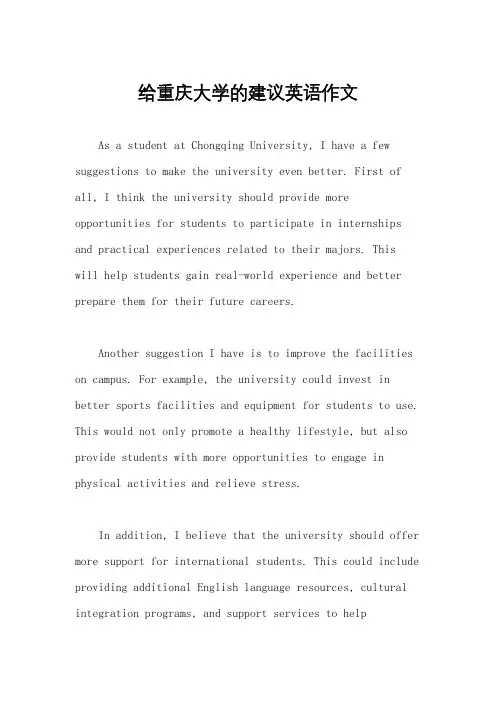
给重庆大学的建议英语作文As a student at Chongqing University, I have a few suggestions to make the university even better. First of all, I think the university should provide more opportunities for students to participate in internships and practical experiences related to their majors. Thiswill help students gain real-world experience and better prepare them for their future careers.Another suggestion I have is to improve the facilities on campus. For example, the university could invest in better sports facilities and equipment for students to use. This would not only promote a healthy lifestyle, but also provide students with more opportunities to engage in physical activities and relieve stress.In addition, I believe that the university should offer more support for international students. This could include providing additional English language resources, cultural integration programs, and support services to helpinternational students adjust to life in Chongqing. This would create a more inclusive and welcoming environment for students from all over the world.Furthermore, I think it would be beneficial for the university to establish more partnerships with local businesses and organizations. This could lead to more opportunities for students to engage in practical projects, research, and networking, which would enhance their overall learning experience.Lastly, I believe that the university should promote more environmental initiatives and sustainability practices. This could include implementing recycling programs,reducing energy consumption, and promoting environmental awareness among students and staff.In conclusion, I believe that implementing these suggestions would help Chongqing University to further improve the overall student experience and academic environment. Thank you for considering my suggestions.。
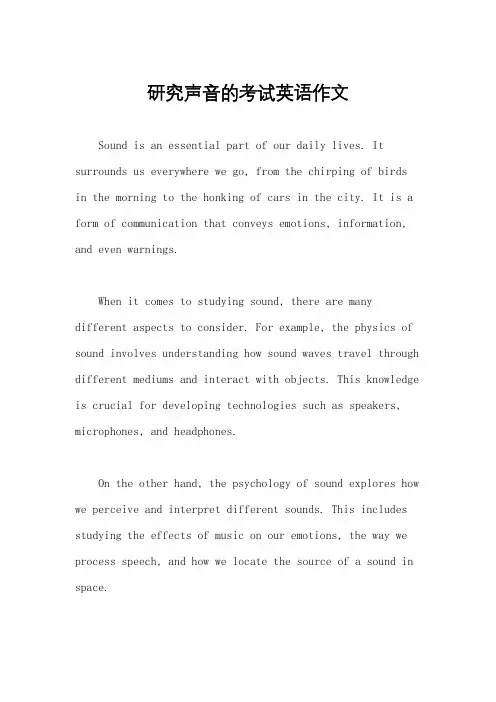
研究声音的考试英语作文Sound is an essential part of our daily lives. It surrounds us everywhere we go, from the chirping of birdsin the morning to the honking of cars in the city. It is a form of communication that conveys emotions, information, and even warnings.When it comes to studying sound, there are many different aspects to consider. For example, the physics of sound involves understanding how sound waves travel through different mediums and interact with objects. This knowledge is crucial for developing technologies such as speakers, microphones, and headphones.On the other hand, the psychology of sound explores how we perceive and interpret different sounds. This includes studying the effects of music on our emotions, the way we process speech, and how we locate the source of a sound in space.In addition, the cultural significance of sound cannot be overlooked. Different cultures have their own unique music, language, and traditions related to sound. For example, the use of drums in African music or the significance of chanting in certain religious practices.Furthermore, sound plays a crucial role in various industries such as entertainment, healthcare, and transportation. For instance, sound engineers work tirelessly to create immersive audio experiences in movies and video games, while doctors use sound waves for medical imaging and diagnosis.In conclusion, the study of sound encompasses a wide range of disciplines and applications. It is a fascinating and complex field that continues to impact our lives in countless ways. Whether we are enjoying our favorite song, communicating with others, or simply appreciating the sounds of nature, sound is an integral part of human experience.。
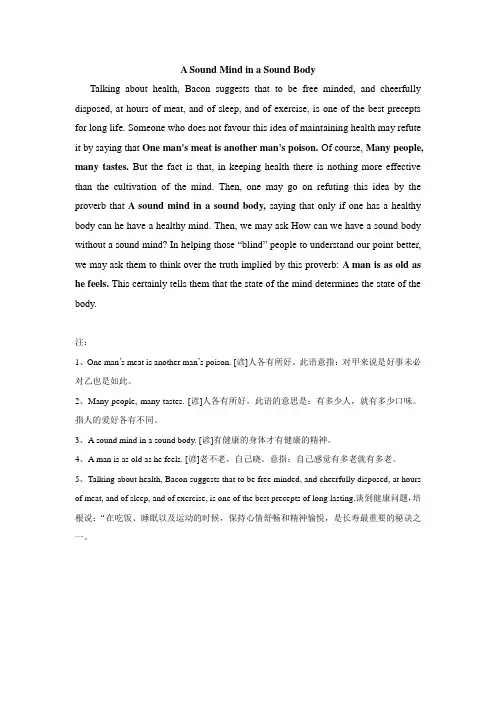
A Sound Mind in a Sound BodyTalking about health, Bacon suggests that to be free minded, and cheerfully disposed, at hours of meat, and of sleep, and of exercise, is one of the best precepts for long life. Someone who does not favour this idea of maintaining health may refute it by saying that One man's meat is another man's poison. Of course, Many people, many tastes. But the fact is that, in keeping health there is nothing more effective than the cultivation of the mind. Then, one may go on refuting this idea by the proverb that A sound mind in a sound body, saying that only if one has a healthy body can he have a healthy mind. Then, we may ask How can we have a sound body without a sound mind? In helping those “blind” people to understand our point better, we may ask them to think over the truth implied by this proverb: A man is as old as he feels. This certainly tells them that the state of the mind determines the state of the body.注:1、One man’s meat is another man’s poison. [谚]人各有所好。
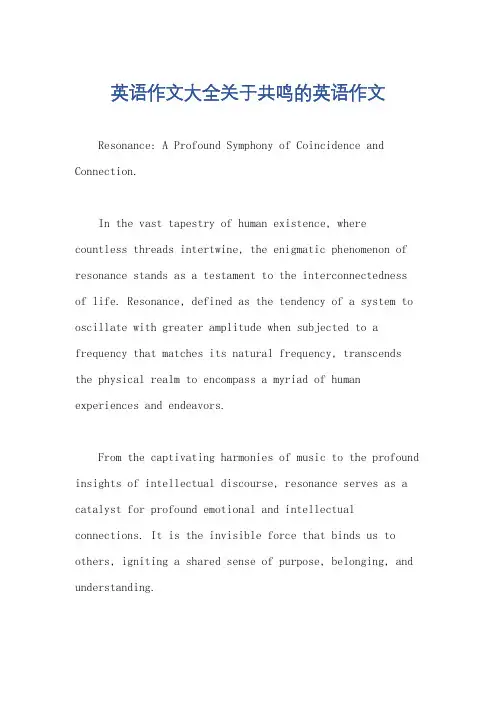
英语作文大全关于共鸣的英语作文Resonance: A Profound Symphony of Coincidence and Connection.In the vast tapestry of human existence, where countless threads intertwine, the enigmatic phenomenon of resonance stands as a testament to the interconnectedness of life. Resonance, defined as the tendency of a system to oscillate with greater amplitude when subjected to a frequency that matches its natural frequency, transcends the physical realm to encompass a myriad of human experiences and endeavors.From the captivating harmonies of music to the profound insights of intellectual discourse, resonance serves as a catalyst for profound emotional and intellectual connections. It is the invisible force that binds us to others, igniting a shared sense of purpose, belonging, and understanding.Music, with its ability to transcend linguistic and cultural barriers, provides a prime example of the power of resonance. When an instrument is played at the right frequency, it sets off vibrations that resonating with the strings of a nearby instrument, causing them to vibrate in unison. This phenomenon, known as sympathetic resonance, is not limited to musical instruments but extends to human listeners as well.Exposure to music that resonates with our inner being can evoke a myriad of emotions, from joy and exhilaration to sadness and contemplation. It can stir memories, inspire dreams, and connect us with the universal human experience. Music has the power to heal, to unite, and to uplift, tapping into the deep emotional wellsprings that lie within us all.Beyond the realm of music, resonance manifests itself in numerous other facets of human life. In the field of communication, resonance fosters effective listening and understanding. When two individuals truly resonate with each other, they listen not only with their ears but alsowith their hearts and minds. They attune themselves to the nuances of each other's speech, their body language, and their emotions, creating a deep and meaningful connection.In the realm of ideas, resonance facilitates the exchange of knowledge and perspectives. When two minds come together on a topic that sparks their passion, they engage in a dialogue that resonates with both their intellects and emotions. They challenge each other's assumptions, share insights, and build upon each other's thoughts, leading to a synergistic synthesis of ideas.Resonance is not confined to intellectual pursuits. It permeates the social fabric, fostering a sense of community and belonging. When individuals feel like they resonate with the values, beliefs, and goals of their group, they experience a profound connection that transcends personal differences. This sense of shared purpose and mutual support provides a foundation for strong and resilient communities.The power of resonance extends to the very core of ourbeing. When we encounter people, places, or experiencesthat resonate with our innermost selves, we experience a sense of profound authenticity and connection. It is in these moments of resonance that we discover who we truly are and what we are meant to become.Resonance is not always a harmonious experience. It can also manifest in the form of conflict and disagreement. When two opposing views collide, it can be challenging to find common ground or to navigate the ensuing dissonance. However, even in these instances, resonance has the potential to lead to growth and understanding. By engaging in respectful and empathetic dialogue, individuals can bridge divides and forge new connections that transcend their differences.The phenomenon of resonance underscores the interconnectedness of all things. It reminds us that we are part of a larger tapestry of existence and that our actions and choices have ripple effects that extend far beyond ourselves. By embracing the power of resonance, we can cultivate deeper connections with others, foster a sense ofshared purpose, and unlock the transformative potential that lies within us all.In the words of the renowned author and philosopher Paulo Coelho, "When you want something, all the universe conspires in helping you to achieve it." Resonance is the embodiment of this universal conspiracy, a symphony of coincidences and connections that guide us towards our destiny. By attuning ourselves to the rhythms of life and embracing the power of resonance, we can unlock the full potential of our human experience and create a world that resonates with harmony, understanding, and boundless possibility.。
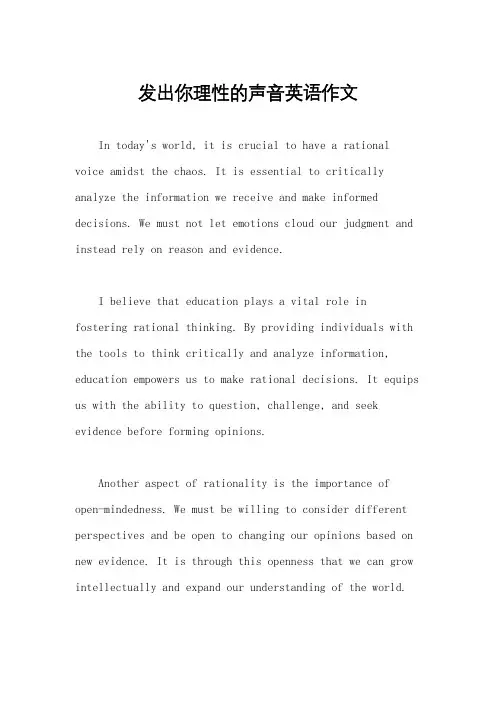
发出你理性的声音英语作文In today's world, it is crucial to have a rational voice amidst the chaos. It is essential to critically analyze the information we receive and make informed decisions. We must not let emotions cloud our judgment and instead rely on reason and evidence.I believe that education plays a vital role infostering rational thinking. By providing individuals with the tools to think critically and analyze information, education empowers us to make rational decisions. It equips us with the ability to question, challenge, and seek evidence before forming opinions.Another aspect of rationality is the importance of open-mindedness. We must be willing to consider different perspectives and be open to changing our opinions based on new evidence. It is through this openness that we can grow intellectually and expand our understanding of the world.Furthermore, it is essential to separate facts from opinions. Facts are objective and can be verified, whereas opinions are subjective and based on personal beliefs or feelings. By distinguishing between the two, we can avoid falling into the trap of misinformation and make rational decisions based on reliable information.In addition, rationality also involves acknowledging our biases and working to overcome them. We all have inherent biases that influence our thinking and decision-making processes. Recognizing these biases allows us to approach situations with a more rational mindset and make fair and impartial judgments.Moreover, rationality requires us to consider the long-term consequences of our actions. It is easy to be swayed by short-term gains or immediate gratification, but a rational thinker looks beyond the present and considers the potential impact of their decisions on the future.Lastly, it is important to approach discussions and debates with civility and respect. Rationality does notmean dismissing others' opinions or engaging in personal attacks. It means listening to different viewpoints, engaging in constructive dialogue, and being open to changing our minds if presented with compelling arguments.In conclusion, in a world filled with noise and misinformation, it is crucial to have a rational voice. Education, open-mindedness, fact-checking, acknowledging biases, considering long-term consequences, and engaging in respectful discussions are all essential components of rational thinking. By embracing these principles, we can navigate through the complexities of life and make informed decisions.。
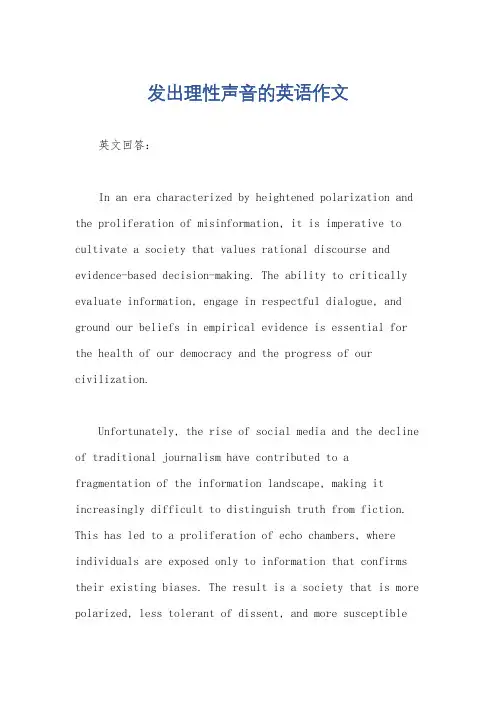
发出理性声音的英语作文英文回答:In an era characterized by heightened polarization and the proliferation of misinformation, it is imperative to cultivate a society that values rational discourse and evidence-based decision-making. The ability to critically evaluate information, engage in respectful dialogue, and ground our beliefs in empirical evidence is essential for the health of our democracy and the progress of our civilization.Unfortunately, the rise of social media and the decline of traditional journalism have contributed to a fragmentation of the information landscape, making it increasingly difficult to distinguish truth from fiction. This has led to a proliferation of echo chambers, where individuals are exposed only to information that confirms their existing biases. The result is a society that is more polarized, less tolerant of dissent, and more susceptibleto manipulation.To combat these challenges, we must make a concerted effort to foster a culture of rational discourse. This requires a commitment to the following principles:Critical thinking: We must teach our children and ourselves how to evaluate information critically, identify fallacies, and distinguish between facts and opinions.Empathy: We must cultivate empathy for those who hold different views, even if we disagree with them. This requires us to listen to their perspectives without interrupting or dismissing them.Respect: We must treat others with respect, even when we disagree with their beliefs. This means engaging in dialogue without resorting to personal attacks or insults.Humility: We must recognize that we do not have all the answers and that our beliefs are always subject to revision in light of new evidence.In addition to these individual efforts, we must also support institutions that promote rational discourse. These include schools, universities, libraries, and news organizations. These institutions have a responsibility to provide access to accurate information and to foster an environment where critical thinking and respectful dialogue can flourish.By embracing these principles and supportinginstitutions that promote rational discourse, we can create a society that is more informed, more tolerant, and more capable of solving the complex challenges we face.中文回答:在极度两极分化和错误信息泛滥的时代,培养一个重视理性论述和基于证据的决策的社会势在必行。
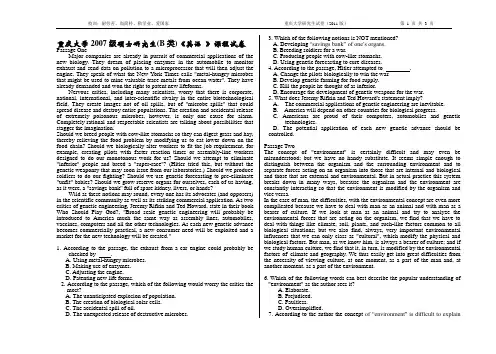
重庆大学2007级硕士研究生(B类)《英语》课程试卷Passage OneMajor companies are already in pursuit of commercial applications of the new biology. They dream of placing enzymes in the automobile to monitor exhaust and send data on pollution to a microprocessor that will then adjust the engine. They speak of what the New York Times calls "metal-hungry microbes that might be used to mine valuable trace metals from ocean water". They have already demanded and won the right to patent new lifeforms.Nervous critics, including many scientists, worry that there is corporate, national, international, and inter-scientific rivalry in the entire biotechnological field. They create images not of oil spills, but of "microbe spills" that could spread disease and destroy entire populations. The creation and accidental release of extremely poisonous microbes, however, is only one cause for alarm. Completely rational and respectable scientists are talking about possibilities that stagger the imagination.Should we breed people with cow-like stomachs so they can digest grass and hay, thereby relieving the food problem by modifying us to eat lower down on the food chain? Should we biologically alter workers to fit the job requirement, for example, creating pilots with faster reaction times or assembly-line workers designed to do our monotonous work for us? Should we attempt to eliminate "inferior" people and breed a "super-race"? (Hitler tried this, but without the genetic weaponry that may soon issue from our laboratories.) Should we produce soldiers to do our fighting? Should we use genetic forecasting to pre-eliminate "unfit" babies? Should we grow reserve organs for ourselves, each of us having, as it were, a "savings bank'' full of spare kidney, livers, or hands?Wild as these notions may sound, every one has its advocates (and opposers) in the scientific community as well as its striking commercial application. As two critics of genetic engineering, Jeremy Rifkin and Ted Howard, state in their book Who Should Play God?, "Broad scale genetic engineering will probably be introduced to America much the same way as assembly lines, automobiles, vaccines, computers and all the other technologies. As each new genetic advance becomes commercially practical, a new consumer need will be exploited and a market for the new technology will be created."1. According to the passage, the exhaust from a car engine could probably bechecked by .B. Making use of enzymes.C. Adjusting the engine.D. Patenting new life forms.2. According to the passage, which of the following would worry the critics themost?A. The unanticipated explosion of population.B. The creation of biological solar cells.C. The accidental spill of oil.D. The unexpected release of destructive microbes.3. Which of the following notions is NOT mentioned?A. Developing ―savings bank‖ of one‘s organs.B. Breeding soldiers for a war.C. Producing people with cow-like stomachs.D. Using genetic forecasting to cure diseases.4. According to the passage, Hitler attempted to .B. Develop genetic farming for food supply.C. Kill the people he thought of as inferior.D. Encourage the development of genetic weapons for the war.5. What does Jeremy Rifkin and Ted Howard's statement imply?A. The commercial applications of genetic engineering are inevitable.B. America will depend on other countries for biological progress.C. Americans are proud of their computers, automobiles and genetictechnologies.D. The potential application of each new genetic advance should be controlled.Passage TwoThe concept of "environment" is certainly difficult and may even be misunderstood; but we have no handy substitute. It seems simple enough to distinguish between the organism and the surrounding environment and to separate forces acting on an organism into those that are internal and biological and those that are external and environmental. But in actual practice this system breaks down in many ways, because the organism and the environment are constantly interacting so that the environment is modified by the organism and vice versa.In the case of man, the difficulties, with the environmental concept are even more complicated because we have to deal with man as an animal and with man as a bearer of culture. If we look at man as an animal and try to analyze the environmental forces that are acting on the organism, we find that we have to deal with things like climate, soil, plants, and such-like factors common to all biological situations; but we also find, always, very important environmental influences that we can only class as "cultural", which modify the physical and biological factors. But man, as we know him, is always a bearer of culture; and if we study human culture, we find that it, in turn, is modified by the environmental factors of' climate and geography. We thus easily get into great difficulties from the necessity of viewing culture, at one moment, as a part of the man and, at another moment, as a part of the environment.6. Which of the following words can best describe the popular understanding of "environment" as the author sees it?A. Elaborate.B. Prejudiced.C. Faultless.D. Oversimplified.7. According to the author the concept of ―environment" is difficult to explainbecause .B. it involves both internal and external forcesC. the organism and the environment influence each otherD. the relationship between the organism and the environment is unclear8. In analyzing the environmental forces acting on man the author suggeststhat .to manB. man and other animals are modified equally by the environmental forcesC. man is modified by the cultural environment as well as by the naturalenvironmentD. physical and biological factors exert more influence on other organismsthan on man9. As for culture, the author points out that .B. it is also affected by environmental factorsC. it is generally accepted to be part of the environmentD. it is a product of man's biological instincts10. In this passage, the author is primarily concerned with .A. the interpretation of the term "environment"B. the discussion on organisms and biological environmentC. the comparison between internal and external factors influencing manD. the evaluation of man's influence on culturePassage ThreeThe tourist trade is booming. With all this coming and going, you‘d expect greater understanding to develop between the nations of the world. Not a bit of it! Superb systems of communication by air, sea and land make it possible for us to visit each other‘s countries at a moderate cost. What was once the ‗grand tour‘, reserved for only the very rich, is now within everybody‘s grasp? The package tour and chartered flights are not to be sneered at. Modern travelers enjoy a level of comfort which the lords and ladies on grand tours in the old days couldn‘t have dreamed of. But what‘s the sense of this mass exchange of populations if the nations of the world remain basically ignorant of each other?Many tourist organizations are directly responsible for this state of affairs. They deliberately set out to protect their clients from too much contact with the local population. The modern tourist leads a cosseted(宠爱溺爱的)sheltered life. He lives at international hotels, where he eats his international food and sips his international drink while he gazes at the natives from a distance. Conducted tours to places of interest are carefully censored. The tourist is allowed to see only what the organizers want him to see and no more. A strict schedule makes it impossible for the tourist to wander off on his own; and anyway, language is always a barrier, so he is only too happy to be protected in this way. At its very worst, this leads to a new and hideous kind of colonization. The summer quarters of the inhabitants of the cite universitaire: are temporarily reestablished on the island of Corfu. Blackpool is recreated at Torremolinos where the traveler goes not to eat paella, but fish and chips.The sad thing about this situation is that it leads to the persistence of national stereotypes. We don‘t see the people of other nations as they really are, but as we have been brought up to believe they are. You can test this for yourself. Take five nationalities, say, French, German, English, American and Italian. Now in your mind, match them with these five adjectives: musical, amorous (多情的), cold, pedantic(学究式的), native. Far from providing us with any insight into the national characteristics of the peoples just mentioned, these adjectives actually act as barriers. So when you set out on your travels, the only characteristics you notice are those which confirm your preconceptions. You come away with the highly unoriginal and inaccurate impression that, say, ‗Anglo-Saxons are hypocrites‘ of that ‗Latin peoples shout a lot‘. You only have to make a few foreign friends to understand how absurd and harmful national stereotypes are. But how can you make foreign friends when the tourist trade does its best to prevent you?Carried to an extreme, stereotypes can be positively dangerous. Wild generalizations stir up racial hatred and blind us to the basic fact—how trite(老一套的) it sounds! – That all people are human. We are all similar to each other and at the same time all unique.11.The best title for this passage is ___________.A. tourism contributes nothing to increasing understanding between nations.B. tourism is tiresome.C. conducted tour is dull.D. tourism really does something to one‘s country.12.What is the author‘s attitude toward tourism?A. apprehensive.B. negative.C. critical.D. appreciative.13.Which word in the following is the best to summarize Latin people shout a lot?A. silent.B. noisy.C. lively.D. active.14.The purpose of the author‘s criticism is to point outA. conducted tour is disappointing.B. the way of touring should be changed.C. when traveling, you notice characteristics which confirm preconception.D. national stereotypes should be changed.15.What is ‗grand tour‘ now?A. moderate cost.B. local sight-seeing is investigated by the tourist organization.C. people enjoy the first-rate comforts.D. everybody can enjoy the ‗grand tour‘.Passage FourThese days we hear a lot of nonsense about the ‗great classless society‘. The idea that the twentieth century is the age of the common man has become one of the great clichés of our time. The same old arguments are put forward in evidence. Here are some of them: monarchy as a system of government has been completely discredited. The monarchies that survive have been deprived of all political power. Inherited wealth has been savagely reduced by taxation and, in time, the great fortunes will disappear altogether. In a number of countries the victory has been complete. The people rule; the great millennium has become a political reality. Bu t has it? Close examination doesn‘t bear out the claim.It is a fallacy to suppose that all men are equal and that society will be leveled out if you provide everybody with the same educational opportunities. (It is debatable whether you can ever provide everyone with the same educational opportunities, but that is another question.) The fact is that nature dispenses brains and ability with a total disregard for the principle of equality. The old rules of the jungle, ‗survival of the fittest‘, and ‗might is right‘ are still with us. The spread of education has destroyed the old class system and created a new one. Rewards are based on merit. For ‗aristocracy(贵族统治)‘ read ‗meritocracy(英才统治‘; in other respects, society remains unaltered: the class system is rigidly maintained.Genuine ability, animal cunning, skill, the knack of seizing opportunities, all bring material rewards. And what is the first thing people do when they become rich? They use their wealth to secure the best possible opportunities for their children, to give them ‗a good start in life‘. For all the lip service we pay to the idea of equality, we do not consider this wrong in the western world. Private schools which offer unfair advantages over state schools are not banned because one of the principles in a democracy is that people should be free to choose how they will educate their children. In this way, the new meritocracy can perpetuate itself to a certain extent: an able child from a wealthy home can succeed far more rapidly than his poorer counterpart. Wealth is also used indiscriminately to further political ends. It would be almost impossible to become the leader of a democracy without massive financial backing. Money is as powerful a weapon as ever it was.In societies wholly dedicated to the principle of social equality, privileged private education is forbidden. But even here people are rewarded according to their abilities. In fact, so great is the need for skilled workers that the least able may be neglected. Bright children are carefully and expensively trained to become future rulers. In the end, all political ideologies boil down to the same thing: class divisions persist whether you are ruled by a feudal king or an educated peasant.16.What is the main idea of this passage?A. Equality of opportunity in the twentieth century has not destroyed the classsystem.B. Equality means money.C. There is no such society as classless society.D. Nature can‘t give you a classless society.17.According to the author, the same educational oppor tunities can‘t get rid ofinequality becauseA. the principle ‗survival of the fittest‘ exists.B. Nature ignores equality in dispensing brains and ability.C. Material rewards are for genuine ability.D. People have the freedom how to educate their children.18.Who can obtain more rapid successA. Those with the best opportunities.B. Those with the best brains.C. those with wealth.D. Those who have the ability to catch at opportunities.19.Why does the author say the new meritocracy can perpetuate itself to acertain extent? BecauseA. money decides everything.B. Private schools offer advantages over state schools.C. People are free to choose the way of educating their children.D. Wealth is used for political ends.20.According to the author, ‗class divisions‘ refers toA. Genius and stupidity.B. Different opportunities for people.C. Oppressor and the oppressed.D. the rich and the poor.21.Part II Translation from English to Chinese 20%Believe me when I tell you that you have been given everything you need. You already own the gifts you seek. They were given to you a long time ago. Don‘t spend your lifetime seeking your happiness, when in reality, you already have the means to it. The amazing part about this secret is that no one can steal it from you. The gifts you have been given, including your very own acres of diamonds are yours to keep and share as you see fit. Everyone is good at something, and you‘ll come to find out that the more you share your treasures, the shinier they get, and the more valuable they become. In turn, you become a richer and happier person.Part III. Translation from Chinese to English 20%承认我们深受偏见的影响没有什么不光彩的。
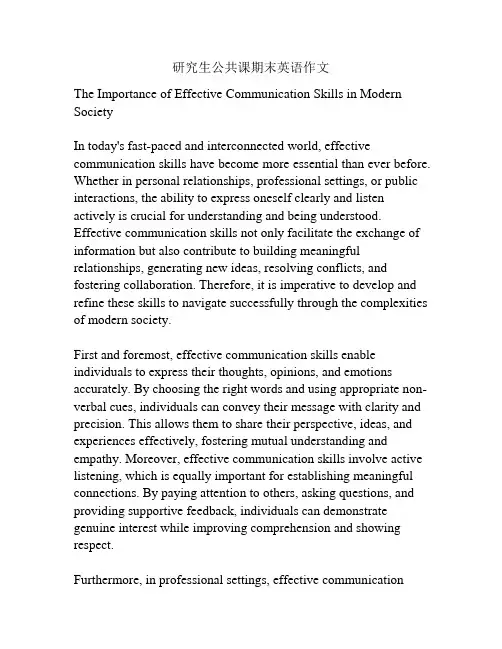
研究生公共课期末英语作文The Importance of Effective Communication Skills in Modern SocietyIn today's fast-paced and interconnected world, effective communication skills have become more essential than ever before. Whether in personal relationships, professional settings, or public interactions, the ability to express oneself clearly and listen actively is crucial for understanding and being understood. Effective communication skills not only facilitate the exchange of information but also contribute to building meaningful relationships, generating new ideas, resolving conflicts, and fostering collaboration. Therefore, it is imperative to develop and refine these skills to navigate successfully through the complexities of modern society.First and foremost, effective communication skills enable individuals to express their thoughts, opinions, and emotions accurately. By choosing the right words and using appropriate non-verbal cues, individuals can convey their message with clarity and precision. This allows them to share their perspective, ideas, and experiences effectively, fostering mutual understanding and empathy. Moreover, effective communication skills involve active listening, which is equally important for establishing meaningful connections. By paying attention to others, asking questions, and providing supportive feedback, individuals can demonstrate genuine interest while improving comprehension and showing respect.Furthermore, in professional settings, effective communicationskills play a pivotal role in achieving success. Whether in team projects, presentations, or job interviews, individuals who can articulate their ideas clearly and concisely are more likely to be understood and respected by their peers, superiors, and interviewers. Effective communication not only helps in conveying instructions and expectations accurately but also enhances collaboration and problem-solving. Moreover, professionals with strong communication skills exhibit leadership qualities, inspire others, and easily adapt to changing situations, all of which are highly valued in today's competitive job market.Additionally, effective communication skills are essential in resolving conflicts and building harmonious relationships. When faced with disagreements or misunderstandings, individuals who possess effective communication skills can express their concerns and viewpoints calmly, allowing for open dialogue and negotiation. By actively listening to others' perspectives, showing empathy, and seeking common ground, conflicts can be resolved amicably, creating an atmosphere of mutual respect and understanding. Moreover, good communication skills enable individuals to express appreciation, support, and encouragement to their loved ones, further strengthening personal relationships.In conclusion, effective communication skills are indispensable in today's society. By enhancing individual expression, active listening, and understanding, these skills foster meaningful connections and open new doors for personal and professional growth. Whether in personal relationships, professional settings, or public interactions, effective communication is the key to success. Therefore, it is crucial to invest time and effort in improvingcommunication skills to navigate the complexities of modern life effectively.。
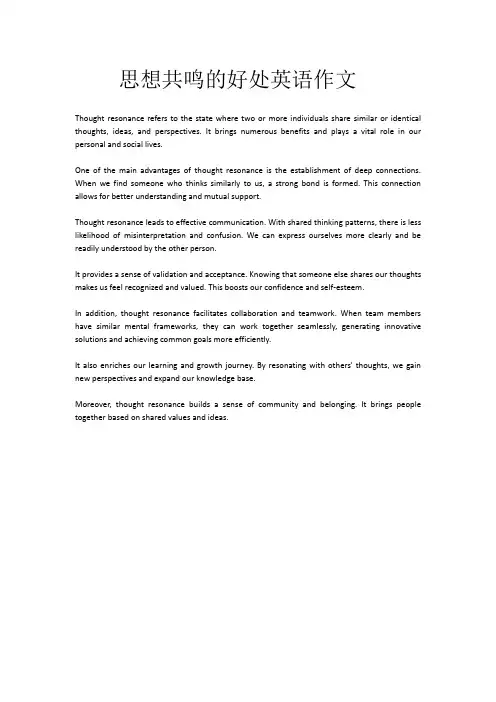
思想共鸣的好处英语作文Thought resonance refers to the state where two or more individuals share similar or identical thoughts, ideas, and perspectives. It brings numerous benefits and plays a vital role in our personal and social lives.One of the main advantages of thought resonance is the establishment of deep connections. When we find someone who thinks similarly to us, a strong bond is formed. This connection allows for better understanding and mutual support.Thought resonance leads to effective communication. With shared thinking patterns, there is less likelihood of misinterpretation and confusion. We can express ourselves more clearly and be readily understood by the other person.It provides a sense of validation and acceptance. Knowing that someone else shares our thoughts makes us feel recognized and valued. This boosts our confidence and self-esteem.In addition, thought resonance facilitates collaboration and teamwork. When team members have similar mental frameworks, they can work together seamlessly, generating innovative solutions and achieving common goals more efficiently.It also enriches our learning and growth journey. By resonating with others' thoughts, we gain new perspectives and expand our knowledge base.Moreover, thought resonance builds a sense of community and belonging. It brings people together based on shared values and ideas.。
The Greatest Invention in the Past CenturyTeacher LouThere are many amazing inventions in the last century. The most important invention, I think, is synthetic plastics.In 1910, the synthetic plastics was first invented by an American chemistwho named Leo Baekeland.The plastic is phenolic resin. Eight years later, anAustriachemist called john invented urea resin. The plasticsis made ofurea resin have the properties oftransparent and light resistance compare with the first one. What’s more, they are nonflammable, lighter, cheaper, higher strength and hardness. The anther most important property is that plastics are anon-conducting materials.At a later time, different plastics that adapted different needs are invented one by one.With those advantages, plastics are used every aspects in our life and produced different goods. Like the surface of electric wire, the shell of computers, the parts of all kinds of household appliances and the articles for daily use. For itself properties of stably, it can be used to packed foods. Without plastics, our daily life maybe become very inconvenient, and other materials which more heavily or light but expensive such as magnesium alloy have tobe used to product products. Even now, new materials haven’t be found to replaces it.Because plastic are so stably, the nature environment unable to degradation it. The environment is serious polluted by plastics products that is optionally dropped by human. So, for our environment, plastic should be classification collection.。
the sound is 什么的英语作文The sound is a fundamental aspect of our lives. It surrounds us, shapes our experiences, and communicates emotions that words cannot express. From the chirping of birds in the morning to the soothing melodies of music, sound holds immense power. In this article, we will explore the significance of sound in various aspects of our lives.In nature, the sound plays a vital role. The sound of waves crashing against the shore creates a calming effect, while the rustling of leaves in the wind brings a sense of tranquility. The chirping of birds signifies the beginning of a new day, filling the air with positive energy. These natural sounds not only connect us with the environment but also provide a sense of peace and harmony.In the realm of music, sound becomes an art form. Music has the ability to evoke emotions, transport us to different eras, and unite people from diverse cultures. The sound of a violin can bring tears to our eyes, while the beat of a drum can make us dance with joy. Whether it's classical, rock, or jazz, music speaks to our souls and has the power to heal, inspire, and bring people together.In communication, sound plays a crucial role. The spoken word allows us to express our thoughts, share ideas, and connect with others. The tone and pitch of our voice convey emotions, making our words more impactful. A gentle whisper can convey intimacy, while a loud shout can express anger or urgency. Sound in communication is not limited to verbal language; it also includes non-verbal cues such as laughter, sighs, or even silence, which can convey a multitude of emotions.In technology, sound has revolutionized our lives. From the invention of the telephone by Alexander Graham Bell to the modern-day smartphones, sound has enabled us to communicate across vast distances. The sound of a notification on our phones alerts us to incoming messages or calls, keeping us connected at all times. In entertainment, sound enhances our movie-watching experience, immersing us in the story and creating a realistic atmosphere.In conclusion, the sound is an integral part of our lives. It connects us with nature, evokes emotions through music, facilitates communication, and enhances our technological experiences. The power of sound is undeniable, and it is essential to appreciate and cherish the sounds that surround us. So, the next time you hear the sound of birds chirping or your favorite song playing, take a moment to pause, listen, and appreciate the beauty and significance of sound in our lives.。
研究生英语作文音乐Music holds a special place in our lives, offering comfort, inspiration, and a means of self-expression. It connects people from different cultures and backgrounds, transcending language barriers. However, when we listen to music, we often find ourselves attaching titles or labels to songs or genres. In this essay, I would like to explore the idea that music should be appreciated without any titles, allowing listeners to experience it purely and form their own interpretations.First and foremost, removing titles from music allows us to approach it with open minds. Sometimes, titles can shape our expectations and bias our perceptions of a piece. For example, if a song is titled "Sadness," we might anticipate a somber melody and melancholic lyrics. By eliminating such labels, we can engage with the music without any predefined notions, enabling a deeper connection with the emotions it evokes.Furthermore, removing titles encourages subjective interpretation. When we listen to a song, each individual may resonate with different aspects based on their personal experiences. By not having a specific title to guide our understanding, we are free to interpret the music in ways that are meaningful to us. This personal connection deepens the emotional impact and allows for a more enriching experience of the music.Moreover, music without titles promotes inclusivity and unity. Whether it is classical, pop, jazz, or folk, every genre has its unique charm and appeal. When we strip away titles, we can appreciate the diverse range of music without categorizing ormaking distinctions. This inclusivity leads to a greater sense of unity and harmony among music lovers worldwide.In addition, music without titles grants artists the freedom to express themselves without limitations. Titles often create expectations and impose boundaries on artistic creativity. By letting go of these labels, musicians can explore new styles and experiment with different sounds, leading to dynamic and innovative compositions.Finally, music without titles allows for greater exploration and discovery. Without preconceived notions, listeners are more likely to explore a wide range of music, be it from various cultures or time periods. They can discover hidden gems and appreciate diverse musical expressions that they might have overlooked if titles played a more prominent role.In conclusion, removing titles from music enables us to experience it more authentically, without any preconceived notions or biases. It allows for subjective interpretation, promotes inclusivity and unity, encourages artistic freedom, and enhances exploration and discovery. By appreciating music in this way, we can truly immerse ourselves in its beauty and connect with its universal language.。
重庆大学英语作文Chongqing University, nestled in the heart of the vibrantcity of Chongqing, is not just an educational institution but a beacon of knowledge and culture. As a student, I am privileged to be part of this esteemed university that has been shaping the minds of young scholars for decades.The campus itself is a blend of traditional Chinese architecture and modern facilities, creating a harmonious environment conducive to learning. The lush greenery and the serene atmosphere provide a perfect backdrop for intellectual pursuits and personal growth.Academically, Chongqing University offers a diverse range of programs, ensuring that students can pursue their passions and interests. The faculty is composed of distinguished scholars who are not only well-versed in their respective fields but also committed to nurturing the next generation of leaders.One of the most striking aspects of the university is its commitment to innovation and research. The university encourages students to think critically and creatively, fostering an environment where new ideas are born and developed. This spirit of innovation is evident in the numerous research projects and start-ups that have emerged from the university.Culturally, Chongqing University is a melting pot of ideas and traditions. With students from various provinces and countries, the campus is a vibrant hub of diversity. The university hosts various cultural events and festivals, celebrating the rich tapestry of its student body.Socially, the university provides ample opportunities for students to engage in extracurricular activities. From sports to arts and community service, there is something for everyone. These activities not only enrich the student experience but also help in developing well-rounded individuals.In conclusion, Chongqing University is more than just a place of education; it is a community that fosters excellence, innovation, and cultural exchange. As I continue my journey here, I am confident that the experiences and knowledge gained will be instrumental in shaping my future endeavors.。
声音放松的重要性英语作文The Importance of Relaxation through Sound。
In today's fast-paced world, it's easy to get caught up in the hustle and bustle of daily life. We often find ourselves working long hours, dealing with stress and anxiety, and struggling to find any time for ourselves. However, it's important to remember that relaxation is crucial for our mental and physical health. One effective way to achieve relaxation is through the use of sound.Sound has been used for centuries as a way to promote relaxation and healing. From the soothing sounds of nature to the rhythmic beats of music, sound has the power to calm our minds and bodies. Here are some ways in which sound can be used to promote relaxation:1. Meditation: Meditation is a powerful tool for relaxation, and sound can enhance the experience. Many people use guided meditations that incorporate calmingsounds, such as ocean waves or bird songs, to help themrelax and focus.2. Music therapy: Music therapy is a form of treatment that uses music to promote healing and relaxation. It has been shown to be effective in treating a variety of conditions, including anxiety, depression, and chronic pain.3. White noise: White noise is a type of sound that contains all frequencies at equal levels. It can be used to drown out distracting sounds and create a peaceful environment for relaxation.4. Binaural beats: Binaural beats are a type of sound therapy that uses two different tones played at slightly different frequencies. The brain perceives the difference between the two frequencies as a third tone, which can help induce relaxation.5. ASMR: ASMR, or Autonomous Sensory Meridian Response, is a sensation of tingling and relaxation that some people experience in response to certain sounds, such aswhispering or tapping. ASMR videos on YouTube have become increasingly popular as a way to promote relaxation and sleep.In conclusion, relaxation is essential for our mental and physical well-being, and sound can be a powerful tool in achieving it. Whether through meditation, music therapy, white noise, binaural beats, or ASMR, there are many ways to incorporate sound into our relaxation routines. By taking the time to relax and unwind, we can improve our overall health and quality of life.。
什么是健全心智目前,很多人对什么是健全心智不是很清楚,有的人认为健全心智就是要人有一个健康的心理,而有的人却认为一个心智健全的人不仅要具有健康的心理而且还要有高尚的道德素养。
对于心智健全的定义有应该是什么呢?对健全心智的理解包括人性观、价值取向及方法论。
综合各学派的观点,得出以下几方面对于心智健全有突出定义。
首先具有客观的自我认识和积极的自我态度,其次是具有客观的社会知觉和建立适宜的人际关系的能力,再是具有生活的热情和有效解决问题的能力,心理健康的人应该热爱生活,有投身于工作事业和家庭的热情,最后是个性结构具有协调性。
通过以上的陈述,我认为健全的心智就是一种人性观、价值取向及方法论的总和。
每个人的人性观、价值取向及方法论不同就会造成对健全心智的理解差异。
What is a sound mindRecently, increasingly growing the number of people do not understand the define of definition about sound mind. Some persons view sound mind as mental health. However, other people believe the human that have sound mind with mental health and fine moral. What should be a sound mind?The sound mind definition include view of human nature, value, and methodology. Comprehensive view of each school, I have the following aspects for definition of sound mind. Firstly, people need to own selfconscious and positive selfattitude. Secondly, we should have objective social sense and fine relationship. What’s more, persons also possess living enthusiasm and ability about effectively solving the problem. Mental health people should love life, have a enthusiasm engaged in career and family. Finally, personality structure owns coordination.As the above statement, I believe that sound mind definition is a sum of view of human nature, values, methodology. It’s difference will result in a different understanding in sound mind.。
Whatis a sound mind?
Teacher Lou
Everyone has different view of a sound mind. In my opinion, a sound mind has those characters such as good listening, honesty, believing and bravery.
God gives us a mouth but two ears. It tell us that a good listener is more important than talker. But, it’s not easy to do. When we talk about own view about someone or something, we usually lack think time at the same time. Listening can give us knowledge and inspiration from others and sharpen ours wits every now and then. What’s more, a prefect plan or decision always bases on sufficient listen. So, it’s important to be a listener.
Not only be a listener, but an honest listener. We touch with others with an honest attitude instead of cheat at first. Honesty always bring us deeper comprehension of others, even though it will change our origin mind. Many opportunities or advances are from our honest attitude. Honesty is necessary for a sound mind too.Sometimes, we can’t harvest honesty from others. We may shake our honest mind. In this situation, the belief of the goodness of others helps us keep honest. The beliefs can help us avoid loss ours direction. Also, beliefs give us bravery to bear responsibility. In society, we play different roles which have different responsibilities in different period.Thebeliefs and braverybring us the power of overcome innumerabledifficult in life.
So, the sound mind that contain those charactersgood listening, honesty, believing and brave.They are supplement each other.。